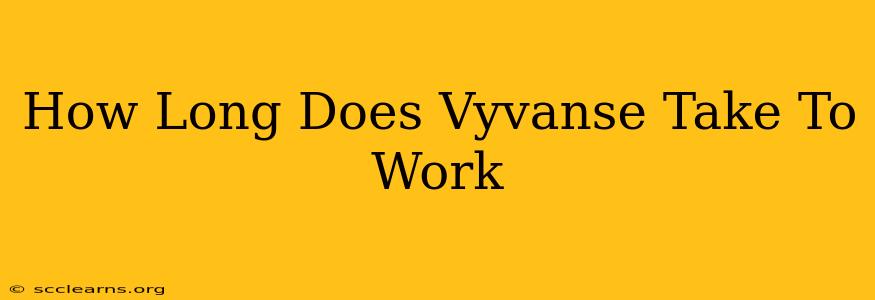Vyvanse, a medication commonly prescribed for Attention-Deficit/Hyperactivity Disorder (ADHD) and binge eating disorder, is a powerful stimulant. Understanding its onset and duration of action is crucial for effective management and treatment. This guide explores how long it takes Vyvanse to work, factors influencing its effectiveness, and what to expect during treatment.
How Long Until I Feel the Effects of Vyvanse?
The time it takes for Vyvanse to take effect varies significantly between individuals. While many people experience noticeable effects within 30 to 60 minutes of taking a dose, it can sometimes take longer, even up to 2 hours in some cases. This variability is influenced by several factors, including:
Factors Affecting Vyvanse's Onset:
- Metabolism: Individual metabolic rates play a significant role. Faster metabolism may lead to quicker onset, while slower metabolism may result in a delayed effect.
- Dosage: Higher doses may take slightly longer to reach peak effectiveness.
- Food: Taking Vyvanse on an empty stomach generally leads to a faster onset compared to taking it with food.
- Individual Variations: Body weight, age, and overall health can all influence the time it takes for Vyvanse to work.
- Formulation: The specific formulation of Vyvanse can slightly influence absorption rates.
The Duration of Vyvanse's Effects:
While the onset time is variable, the duration of Vyvanse's effects is generally consistent. Most people experience the full effects for 4 to 6 hours, although this can extend to 8 hours in some individuals. The medication is gradually eliminated from the body, leading to a gradual decrease in its effects.
What to Expect When Vyvanse Starts Working:
The effects of Vyvanse vary from person to person, but common experiences include:
- Improved Focus and Concentration: This is often the most noticeable effect for individuals with ADHD.
- Reduced Hyperactivity and Impulsivity: Many users report a decrease in fidgeting, restlessness, and impulsive behaviors.
- Increased Alertness and Energy: Vyvanse can improve mental clarity and energy levels.
- Improved Mood: Some individuals find that Vyvanse improves their overall mood and emotional regulation.
However, it's important to note that some individuals may experience side effects. These can include:
- Decreased Appetite: Reduced appetite is a common side effect.
- Insomnia: Difficulty sleeping is possible, especially if Vyvanse is taken later in the day.
- Headache: Headaches can occur, particularly in the early stages of treatment.
- Anxiety: In some cases, Vyvanse can induce anxiety or nervousness.
- Stomach Issues: Nausea or stomach upset is possible.
When to Consult Your Doctor:
If you are experiencing significant side effects, or if Vyvanse doesn't seem to be working effectively after a reasonable period, it's crucial to consult your doctor. They can adjust your dosage, explore alternative medications, or address any underlying concerns. Never adjust your dosage without your doctor's guidance.
Conclusion:
Understanding the timeframe for Vyvanse's effects is important for managing your treatment. While onset time is variable, remember that consistency and open communication with your doctor are key to optimizing your treatment plan. Always follow your doctor's instructions carefully. The information provided here is intended for educational purposes only and does not constitute medical advice. Consult a healthcare professional for any questions or concerns regarding your health or medication.

